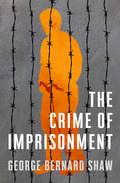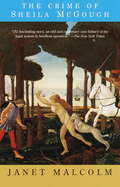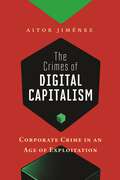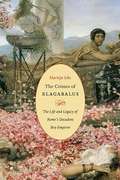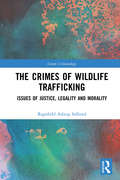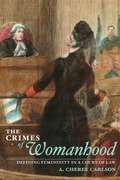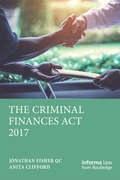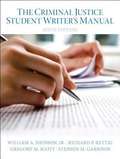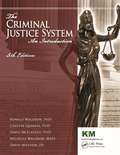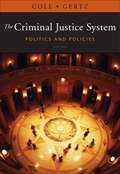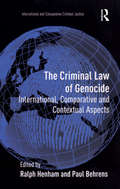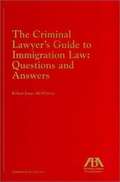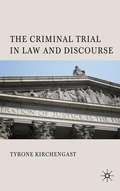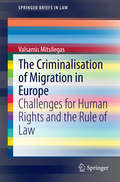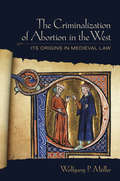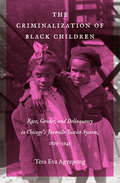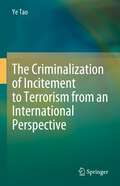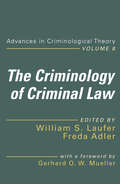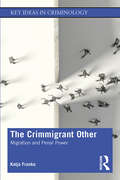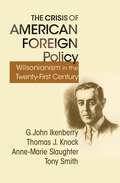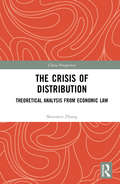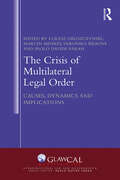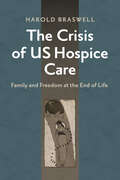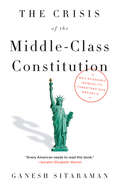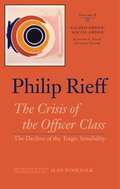- Table View
- List View
The Crime of Imprisonment
by George Bernard ShawThe Nobel Prize–winning social critic examines the absurdities and moral indignities of modern incarceration in this classic work. Best known for his theatrical works of biting social satire, George Bernard Shaw was also a committed political activist who, at various times, found himself in conflict with the law. Though he was never arrested, Shaw was deeply concerned with the experience of imprisonment and its debilitating effects on inmates. In this polemical study of the contemporary prison system, Shaw dismantles many of the standard arguments for harsh prison sentences. He argues that the impulse for retribution is at odds with the goal of reform, and that prison often fosters greater criminality rather than acting as a deterrent.
The Crime of Sheila McGough
by Janet Malcolm"[N]o other writer tells better stories about the perpetual, the unwinnable, battle between narrative and truth." --The New York Times Book ReviewThe Crime of Sheila McGough is Janet Malcolm's brilliant exposé of miscarriage of justice in the case of Sheila McGough, a disbarred lawyer recently released from prison. McGough had served 2 1/2 years for collaborating with a client in his fraud, but insisted that she didn't commit any of the 14 felonies she was convicted.An astonishingly persuasive condemnation of the cupidity of American law and its preference for convincing narrative rather than the truth, this is also a story with an unconventional heroine. McGough is a zealous defense lawyer duped by a white-collar con man; a woman who lives, at the age of 54, with her parents; a journalistic subject who frustrates her interviewer with her maddening literal-mindedness. Spirited, illuminating, delightfully detailed, The Crime of Sheila McGough is both a dazzling work of journalism and a searching meditation on character and the law.
The Crimes of Digital Capitalism: Corporate Crime in an Age of Exploitation (Justice, Inequality, and the Digital World)
by Aitor JiménezHow technology companies profit from our increasing dependence on digital infrastructure and the privatization of dataThe Crimes of Digital Capitalism proposes the first comprehensive theory of corporate crime for the digital age. Aitor Jiménez explores the criminal structure of digital capitalism fostered by states and corporations along the supply chain, illustrating how the rise of algorithmic racism, the Googlization of education, and the deployment of AI surveillance/killing technologies brutally impacts the lives of millions of people around the world.Under the label of digital capitalism, argues Jiménez, lives a system of exploitation that, standing on digital technologies, is pushing the neoliberal project into an entirely new dimension of practices and exploitative policies with its own set of socially harmful consequences. Digital capitalism has accelerated the neoliberal attack on labor rights, expanded previous forms of exploitation, and developed new ways of surveilling and controlling workers. Delving into the structural relation between capitalism and corporate crime in the digital age, The Crimes of Digital Capitalism argues that the massive social harms caused by large technology companies and states should not be seen as accidental by-products, but as criminal strategies necessary for the existence of digital capitalism.Linking the debates on the platform economy to today’s most pressing social justice issues, this deeply interdisciplinary book connects complex ideas around digital capitalism to everyday problems.
The Crimes of Elagabalus: The Life and Legacy of Rome's Decadent Boy Emperor
by Martijn IcksThe four short years of Elagabalusâs rule have generated nearly two millennia of sustained attention, from salacious rumor to scholarly analysis to novels that cast him as a gay hero avant la lettre. Here, Martijn Icks succeeds in distinguishing the reality of the emperorâs brief life from the myth that clouds itâand in tracing the meaning of the myth itself to the present day. In 219 ce, when the fourteen-year-old Syrian arrived in Rome to assume the throne, he brought with him a conical black stone, which he declared was the earthly form of the sun god El-Gabal, who gave Elagabalus his name and lifelong office as high priest. Shoving Jupiter aside, the new emperor did the unthinkable, installing El-Gabal at the head of the Roman pantheon and marrying a vestal virgin. Whether for these offenses, his neglect of the empire, or weariness from watching the emperor dance at the elaborate daily sacrifices, the imperial guards murdered Elagabalus and put El-Gabal in a packing crate. Sifting through later accounts of the emperorâs outrageous behavior, Icks finds the invented Elagabalus as compelling as the historical figure. In literature, art, and music from the fifteenth century on, Elagabalus appears in many guises, from evil tyrant to anarchist rebel, from mystical androgyne to modern gay teenager, from decadent sensualist to pop star. These many reincarnations reveal as much about the ages that produced them, Icks shows, as they do about the bad-boy emperor himself.
The Crimes of Wildlife Trafficking: Issues of Justice, Legality and Morality (Green Criminology)
by Ragnhild Aslaug SollundThis book examines trade and trafficking in endangered animal species and how the trade increasingly puts large numbers of nonhuman species at risk. Focusing on illegal trafficking, the book also discusses the harmful aspects of the trade and trafficking which is taking place in concordance with laws and regulations. Drawing on the findings of empirical research from Norway and Colombia, the study discusses how this global, transnational trend is addressed, and features of the trade and the ways in which it is controlled in the two case study locations. It also explores the motives driving the trade, and the consequences in terms of animal abuse and environmental harm. The book discusses whether internationally agreed measures, such as international conventions, actually help prevent the trade. Possible ways to address the harms of wildlife trade are considered, including a total ban. The work draws on a green criminology and eco feminist theoretical framework to provide a broad perspective on concepts such as harm, animal rights, species justice and speciesism.
The Crimes of Womanhood: Defining Femininity in a Court of Law
by A. Cheree CarlsonCultural views of femininity exerted a powerful influence on the courtroom arguments used to defend or condemn notable women on trial in nineteenth-century and early-twentieth-century America. A. Cheree Carlson analyzes the colorful rhetorical strategies employed by lawyers and reporters in the trials of several women of varying historical stature, from the insanity trials of Mary Todd Lincoln and Lizzie Borden's trial for the brutal slaying of her father and stepmother, to lesser-known trials involving insanity, infidelity, murder, abortion, and interracial marriage. Carlson reveals clearly just how narrow was the line that women had to walk, since the same womanly virtues that were expected of them--passivity, frailty, and purity--could be turned against them at any time. With gripping retellings and incisive analysis, this book will appeal to historians, rhetoricians, feminist researchers, and anyone who enjoys courtroom drama.
The Criminal Finances Act 2017
by Jonathan S Fisher Anita CliffordThe Criminal Finances Act 2017 introduced the most radical change to tackling money laundering and corruption, recovering the proceeds of crime and counter terrorist financing, since the Proceeds of Crime Act was passed in 2002. This book will provide an excellent commentary on the changes introduced by the Act, with practical insights and an explanation of the Act’s provisions. Topics included are: money laundering; unexplained wealth orders; terrorist property; tax evasion; and reasonable prevention procedures. Authored by Jonathan Fisher QC and Anita Clifford, barristers specializing in proceeds of crime and financial crime cases, this book will be of great interest and importance to all legal professionals working in the financial sector.
The Criminal Justice Student Writer's Manual
by Richard P. Rettig Gregory M. Scott Stephen M. Garrison William A. JohnsonThis comprehensive book is designed to accompany the primary text in any criminal justice class where writing is emphasized, or can be used as an excellent primary text for a criminal justice course in writing administrative and technical reports. The Criminal Justice Student Writer's Manual, 6e is designed to help students learn how to research and write in criminal justice, and improve their writing ability in general. While helping students with every aspect of the writing process-formatting, source citations, grammar, sentence structure, research, and utilizing available sources-it relieves instructors from the time consuming job of teaching these skills, and allows them to concentrate on the subject matter of the course they are teaching. This book is the most comprehensive book on the market that deals specifically with writing criminal justice papers. It gives specific directions for writing a variety of papers in criminal justice, from introductory to advanced, while also providing instructions on "how to write," and how to format the paper and cite sources following the American Sociological Association's and the American Psychological Association's guidelines. There is really no other book on the market that provides the comprehensive directions to writing papers in criminal justice that are found in The Criminal Justice Student Writer's Manual.
The Criminal Justice System: An Introduction, Fifth Edition
by David H. McElreath Chester L. Quarles Michelle E. Waldron David Ethan Milstein Ronald J. WaldronThe Criminal Justice System: An Introduction, Fifth Edition incorporates the latest developments in the field while retaining the basic organization of previous editions which made this textbook so popular. Exploring the police, prosecutors, courts, and corrections, including probation and parole, the book moves chronologically through the differen
The Criminal Justice System: Politics and Policies
by George F. Cole Marc G. GertzLongtime market-leader THE CRIMINAL JUSTICE SYSTEM: POLITICS AND POLICIES, 10/e perfectly balances the enduring classics in the development of criminal justice policy with the latest debates, developments, and research from the field.
The Criminal Law of Genocide: International, Comparative and Contextual Aspects (International and Comparative Criminal Justice)
by Paul BehrensThis collection of essays presents a contextual view of genocide. The authors, who are academic authorities and practitioners in the field, explore the legal treatment, but also the social and political concepts and historical dimensions of the crime. They also suggest alternative justice solutions to the phenomenon of genocide. Divided into five parts, the first section offers an historical perspective of genocide. The second consists of case studies examining recent atrocities. The third section examines differences between legal and social concepts of genocide. Part four discusses the treatment of genocide in courts and tribunals throughout the world. The final section covers alternatives to trial justice and questions of prevention and sentencing.
The Criminal Lawyer's Guide to Immigration Law: Questions and Answers
by Robert James McwhirterSet up in a unique question and answer format, this concise guide focuses on the criminal lawyer's most common questions about immigration law and representing noncitizens.
The Criminal Trial in Law and Discourse
by Tyrone KirchengastThis book examines how the modern criminal trial is the result of competing discourses of justice, from human rights to state law and order, that allows for the consideration of key stakeholder interests, specifically those of victims, defendants, police, communities and the state.
The Criminalisation of Migration in Europe
by Valsamis MitsilegasThis is the first monograph providing a comprehensive legal analysis of the criminalisation of migration in Europe. The book puts forward a definition of the criminalisation of migration as the three-fold process whereby migration management takes place via the adoption of substantive criminal law, via recourse to traditional criminal law enforcement mechanisms including surveillance and detention, and via the development of mechanisms of prevention and pre-emption. The book provides a typology of criminalisation of migration, structured on the basis of the three stages of the migrant experience: criminalisation before entry (examining criminalisation in the context of extraterritorial immigration control, delegation and privatisation in immigration control and the securitisation of migration); criminalisation during stay (examining how substantive criminal law is used to regulate migration in the territory); and criminalisation after entry and towards removal (examining efforts to exclude and remove migrants from the territory and jurisdiction of EU Member States and criminalisation through detention). The analysis focuses on the impact of the criminalisation of migration on human rights and the rule of law, and it highlights how European Union law (through the application of both the EU Charter of Fundamental Rights and general principles of EU law) and ECHR law may contribute towards achieving decriminalisation of migration in Europe.
The Criminalization of Abortion in the West: Its Origins in Medieval Law
by Wolfgang P. MüllerAnyone who wants to understand how abortion has been treated historically in the Western legal tradition must first come to terms with two quite different but interrelated historical trajectories. On one hand, there is the ancient Judeo-Christian condemnation of prenatal homicide as a wrong warranting retribution; on the other, there is the juristic definition of "crime" in the modern sense of the word, which distinguished the term sharply from "sin" and "tort" and was tied to the rise of Western jurisprudence. To find the act of abortion first identified as a crime in the West, one has to go back to the twelfth century, to the schools of ecclesiastical and Roman law in medieval Europe.In this book, Wolfgang P. Müller tells the story of how abortion came to be criminalized in the West. As he shows, criminalization as a distinct phenomenon and abortion as a self-standing criminal category developed in tandem with each other, first being formulated coherently in the twelfth century at schools of law and theology in Bologna and Paris. Over the ensuing centuries, medieval prosecutors struggled to widen the range of criminal cases involving women accused of ending their unwanted pregnancies. In the process, punishment for abortion went from the realm of carefully crafted rhetoric by ecclesiastical authorities to eventual implementation in practice by clerical and lay judges across Latin Christendom. Informed by legal history, moral theology, literature, and the history of medicine, Müller’s book is written with the concerns of modern readers in mind, thus bridging the gap that might otherwise divide modern and medieval sensibilities.
The Criminalization of Black Children: Race, Gender, and Delinquency in Chicago’s Juvenile Justice System, 1899–1945 (Justice, Power, and Politics)
by Tera Eva AgyepongIn the late nineteenth century, progressive reformers recoiled at the prospect of the justice system punishing children as adults. Advocating that children's inherent innocence warranted fundamentally different treatment, reformers founded the nation's first juvenile court in Chicago in 1899. Yet amid an influx of new African American arrivals to the city during the Great Migration, notions of inherent childhood innocence and juvenile justice were circumscribed by race. In documenting how blackness became a marker of criminality that overrode the potential protections the status of "child" could have bestowed, Tera Eva Agyepong shows the entanglements between race and the state's transition to a more punitive form of juvenile justice.In this important study, Agyepong expands the narrative of racialized criminalization in America, revealing that these patterns became embedded in a justice system originally intended to protect children. In doing so, she also complicates our understanding of the nature of migration and what it meant to be black and living in Chicago in the early twentieth century.
The Criminalization of Incitement to Terrorism from an International Perspective
by Ye TaoThis book critically analyzes the criminalization of incitement to terrorism under the fundamental principles of legality, necessity, and proportionality with the aim of striking a fair balance between security and liberty on this complicated issue. The criminalization of incitement to terrorism has gained momentum, but no exact or generally accepted definition of this offense exists at the international level. What’s more, given that the criminalization of incitement to terrorism results in restrictions on the exercise of citizens’ freedom of expression, there should be certain limitations on those criminal measures to avoid unnecessary or disproportionate infringement of this fundamental human right. Nevertheless, there has not been a precise standard by which to determine how to draw the line between anti-terrorism and the protection of freedom of expression. Hence, it could be concluded that the criminalization of incitement to terrorism concerns how to balance security and liberty, and the safeguarding principles of legality, necessity, and proportionality should be fully observed in considering this issue.This book studies definitions of “incitement”, “terrorism”, and “incitement to terrorism” under the relevant international and national legislation, and points out the existing absence, ambiguousness, or substantive divergence in defining actus reus and mens rea regarding incitement to terrorism. It carefully considers the current need for and essential limitations on criminal measures against incitement to terrorism in accordance with the principles of necessity and proportionality, and particularly focuses on how to balance the protection of freedom of expression with the criminalization of incitement to terrorism. In considering how to draw a line between the two, the book formulates precise requirements for objective and subjective elements of this offense in accordance with the principle of legality.Given its scope, it will be of interest not only to academics, human rights lawyers and practitioners, but also to policymakers, as it offers an extensive evaluation of the effects and counter-effects of existing criminal measures.
The Criminology of Criminal Law
by William LauferThe Criminology of Criminal Law considers the relation between criminal law and theories of crime, criminality and justice. This book discusses a wide range of topics, including: the way in which white-collar crime is defined; new perspectives on stranger violence; the reasons why criminologists have neglected the study of genocide; the idea of boundary crossing in the control of deviance; the relation between punishment and social solidarity; the connection between the notion of justice and modern sentencing theory; the social reaction to treason; and the association between politics and punitiveness. Contributors include Bonnie Berry, Don Gottfredson, David F. Greenberg, Marc Riedel, Jason Rourke, Kip Schlegel, Vered Vinitzky-Seroussi, Leslie T. Wilkins, Marvin E. Wolfgang, and Richard A. Wright. The Criminology of Criminal Law concludes with an analysis of the results of a study on the most cited scholars in the Advances in Criminological Theory series. This work will be beneficial to criminologists, sociologists, and scholars of legal studies. Advances in Criminological Theory is the first series exclusively dedicated to the dissemination of original work on criminological theory. It was created to overcome the neglect of theory construction and validation in existing criminological publications.
The Crimmigrant Other: Migration and Penal Power (Key Ideas in Criminology)
by Katja FrankoWestern societies are immersed in debates about immigration and illegality. This book examines these processes and outlines how the figure of the "crimmigrant other" has emerged not only as a central object of media and political discourse, but also as a distinct penal subject connecting migration and the logic of criminalization and insecurity. Illegality defines not only a quality of certain acts, but becomes an existential condition, which shapes the daily lives of large groups within the society. Drawing on rich empirical material from national and international contexts, Katja Franko outlines the social production of the crimmigrant other as a multi-layered phenomenon that is deeply rooted in the intricate connections between law, scientific knowledge, bureaucratic practices, politics and popular discourse.
The Crisis of American Foreign Policy: Wilsonianism in the Twenty-first Century
by G. John Ikenberry Anne-Marie Slaughter Tony Smith Thomas KnockWas George W. Bush the true heir of Woodrow Wilson, the architect of liberal internationalism? Was the Iraq War a result of liberal ideas about America's right to promote democracy abroad? In this timely book, four distinguished scholars of American foreign policy discuss the relationship between the ideals of Woodrow Wilson and those of George W. Bush. The Crisis of American Foreign Policy exposes the challenges resulting from Bush's foreign policy and ponders America's place in the international arena. Led by John Ikenberry, one of today's foremost foreign policy thinkers, this provocative collection examines the traditions of liberal internationalism that have dominated American foreign policy since the end of World War II. Tony Smith argues that Bush and the neoconservatives followed Wilson in their commitment to promoting democracy abroad. Thomas Knock and Anne-Marie Slaughter disagree and contend that Wilson focused on the building of a collaborative and rule-centered world order, an idea the Bush administration actively resisted. The authors ask if the United States is still capable of leading a cooperative effort to handle the pressing issues of the new century, or if the country will have to go it alone, pursuing policies without regard to the interests of other governments. Addressing current events in the context of historical policies, this book considers America's position on the global stage and what future directions might be possible for the nation in the post-Bush era.
The Crisis of Distribution: Theoretical Analysis from Economic Law (China Perspectives)
by Shouwen ZhangThe crisis of distribution is one of the longest standing and most complicated issues facing human society. Imbued with social, political, historic, and cultural elements, it varies significantly across different countries as a result. As an emerging economy which transferred from a planned to a market economy, China has experienced large distribution gaps since it implemented the reform and "opening-up" policy in the early 1980s, requiring stronger economic law to mitigate and regulate the crisis of distribution. In this two-volume set, the author analyzes distribution crises from a theoretical perspective, before going on to propose law and policy solutions. In this first volume, he discusses the four main concepts and focus points of the crisis of distribution – distribution itself, the crises it faces, the rule of law, and development. Concentrating on the major distribution problems China faces in particular, the author proposes regulatory methods which can be used to overcome the distribution dilemma, such as tools from policy and economic law, and reiterates the significance of theory building in resolving the issues. The book should be of keen interest to researchers and students of law, economics, and political science.
The Crisis of Multilateral Legal Order: Causes, Dynamics and Consequences (Transnational Law and Governance)
by Paolo Davide Farah Lukasz Gruszczynski Marcin J. Menkes Veronika BílkováMultilateralism has served as a foundation for international cooperation over the past several decades. Championed after WWII by the United States and Western Europe, it expanded into a broader global system of governance with the end of the Cold War. Lately, an increasing number of States appear to be disappointed with the existing multilateral arrangements, both at the level of norms and that of institutions. The great powers see unilateral and bilateral strategies, which maximize their political leverage rather than diluting it in multilateral fora, as more effective ways for controlling the course of international affairs. The signs of the crisis have been visible for some time – but recent crises indicate an acceleration of on-going disintegration of the multilateral system, such as Brexit, growing resistance on the part of States against international monitoring of compliance and the radical change in the US foreign policy during the presidency of Donald Trump which saw the US from several multilateral agreements (e.g. the Iran Nuclear Deal and the Paris Agreement), leave some international organizations or bodies (e.g. the United Nations Human Rights Council or the World Health Organization) or paralyze some others (e.g. the World Trade Organization (WTO)). Tackling the debate surrounding the crisis of multilateralism and the related transformation of the underlying international legal order, this book analyses selected aspects of the current crisis from the perspective of public international law to identify the nature of the crisis, its dynamics, and consequences.
The Crisis of US Hospice Care: Family and Freedom at the End of Life
by Harold BraswellExploring the failure of hospice in America to care for patients and families at the end of life.Hospice is the dominant form of end-of-life care in the United States. But while the US hospice system provides many forms of treatment that are beneficial to dying people and their families, it does not encompass what is commonly referred to as long-term care, which includes help with the activities of daily living: feeding, bathing, general safety, and routine hygienic maintenance. Frequently, such care is carried out by an informal network of unpaid caregivers, such as the person's family or loved ones, who are often ill-prepared to offer this type of support. In The Crisis of US Hospice Care, Harold Braswell argues that the stress of providing long-term care typically overwhelms family members and that overdependence on familial caregiving constitutes a crisis of US hospice care that limits the freedom of dying people. Arguing for the need to focus on the time just before death, Braswell examines how the relationship of hospice to familial caregiving evolved. He traces the history of hospice over the past fifty years and describes the choice that people dying with inadequate familial support face between a neglectful home environment and an impersonal nursing home.A nuanced look at the personal and political dimensions that shape long-term, end-of-life care, this historical and ethnographic study demonstrates that the crisis in US hospice care can be alleviated only by establishing the centrality of hospice to American freedom. Providing a model for the transformative work that is required going forward, The Crisis of US Hospice Care illustrates the potential of hospice for facilitating a new way of living our last days and for having the best death possible.
The Crisis of the Middle-Class Constitution: Why Economic Inequality Threatens Our Republic
by Ganesh SitaramanIn this original, provocative contribution to the debate over economic inequality, Ganesh Sitaraman argues that a strong and sizable middle class is a prerequisite for America’s constitutional system. For most of Western history, Sitaraman argues, constitutional thinkers assumed economic inequality was inevitable and inescapable—and they designed governments to prevent class divisions from spilling over into class warfare. The American Constitution is different. Compared to Europe and the ancient world, America was a society of almost unprecedented economic equality, and the founding generation saw this equality as essential for the preservation of America’s republic. Over the next two centuries, generations of Americans fought to sustain the economic preconditions for our constitutional system. But today, with economic and political inequality on the rise, Sitaraman says Americans face a choice: Will we accept rising economic inequality and risk oligarchy or will we rebuild the middle class and reclaim our republic? The Crisis of the Middle-Class Constitution is a tour de force of history, philosophy, law, and politics. It makes a compelling case that inequality is more than just a moral or economic problem; it threatens the very core of our constitutional system.
The Crisis of the Officer Class: The Decline of the Tragic Sensibility (Sacred Order/Social Order #2)
by Philip Rieff<p>Philip Rieff earned recognition as one of the most profound social theorists of culture and authority of the twentieth century. Through such works as Freud: The Mind of the Moralist and The Triumph of the Therapeutic, he proved himself an incisive interpreter of Freud and his legacy. His work now culminates with the long-awaited trilogy, Sacred Order/Social Order, a three-volume work on social theory and contemporary culture. <p>In Volume 2, The Crisis of the Officer Class: The Death of the Tragic Sensibility, Phillip Rieff continues his assault against the deathworks of our modern age. Invoking his theory developed in Volume 1, he develops his critique of our current culture as distinguishable only by its rejection of any and all visions of sacred order.</p>
